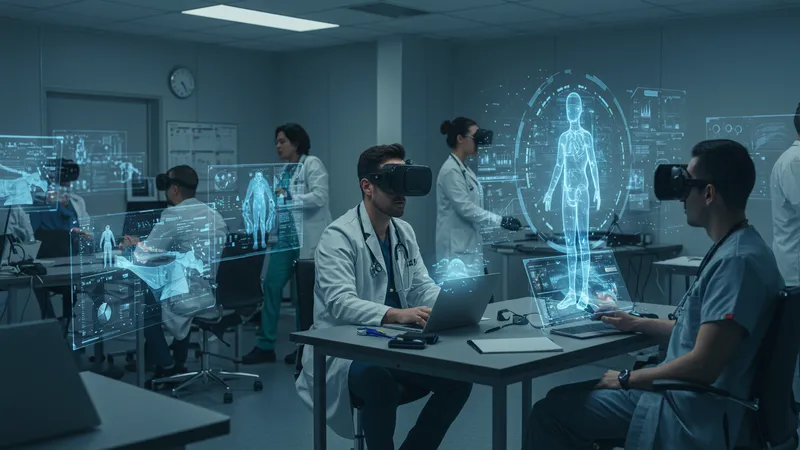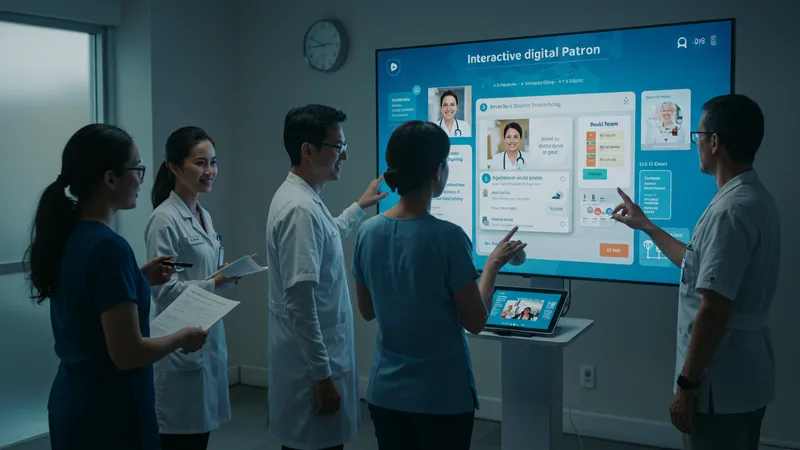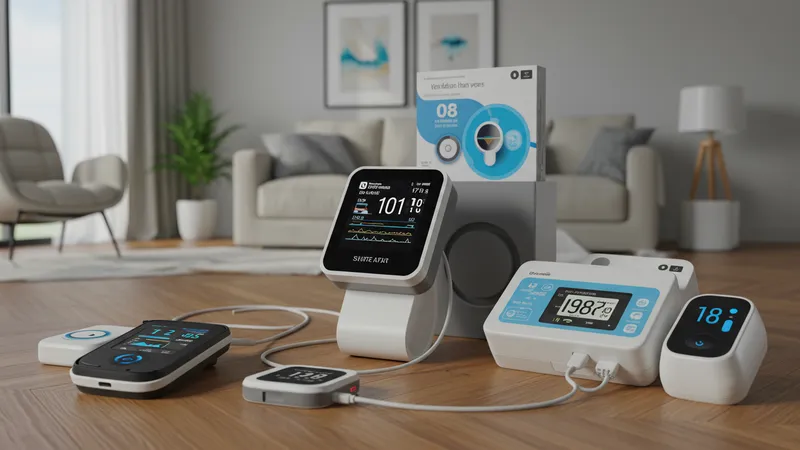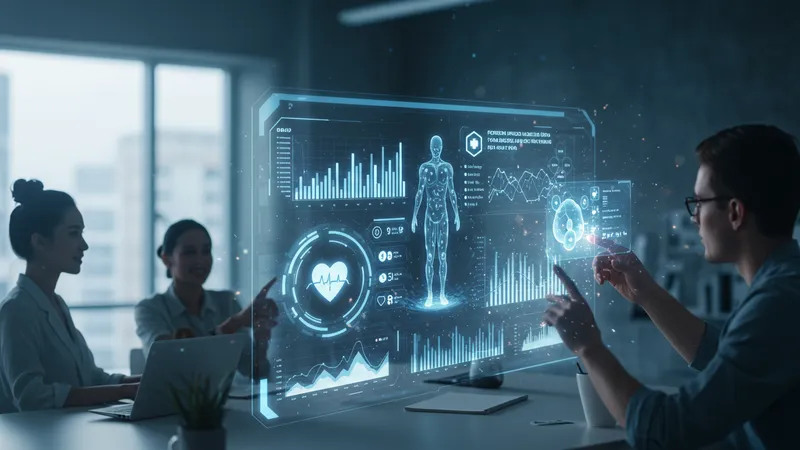


Imagine a world where artificial intelligence reads your vital signs more accurately than a seasoned doctor. This isn't sci-fi—it's happening now, and it's reshaping the healthcare landscape. But wait till you see how deep this revolution goes.
With our healthcare systems under immense strain, the need for game-changing innovations is more critical than ever. New technologies offer solutions that could transform patient care overnight.

While AI has been a buzzword in tech for years, its quiet infiltration into healthcare is a game-changer. New AI algorithms now predict patient deterioration more accurately, potentially saving countless lives. Algorithms that seemed pure fiction just a decade ago are now functioning inside hospital walls worldwide. But that's not even the wildest part…
Patient engagement software is creating an unprecedented link between individuals and healthcare providers. These tools engage patients directly, encouraging adherence and understanding of personal health regimens. Astonishingly, these technologies have increased patient compliance rates by over 30%! Imagine apps guiding your healthcare journey—it's closer than you think. But the surprises don't stop there…
You won't believe what this technology could mean for personalized medicine and preventative care. You're about to dive deep into one of the most unexpected evolutions in modern healthcare. What happens next shocked even the experts…
AI training programs are transforming the skills of medical professionals. By incorporating machine learning techniques, healthcare workers can identify patient needs with uncanny precision. This leap isn't limited to tech geeks. Nurses and doctors alike are embracing AI, integrating these tools into daily routines. Benefits are visible, but you won't believe the hidden opportunities emerging. AI isn't just a tool; it's a mentor guiding healthcare to new heights.

Imagine an AI course where every module builds on real-world scenarios, forcing students to think on their feet like seasoned practitioners. It’s a methodology making waves, producing healthcare professionals who think strategically about problem-solving. This transformative education means that our next generation of doctors could be more data-savvy than ever. But there's one more twist to this revolution…
The cost of these courses has raised eyebrows, yet institutions investing in AI training report a return on investment that's undeniable. A single mistake averted by a well-trained professional pays for the entire course tenfold. Hospitals investing in employee education through AI training see fewer diagnostic errors, but here's the kicker: staff engagement rates are through the roof!
Investors and stakeholders have keenly noted this shift. The demand for AI-trained healthcare workers is skyrocketing, leading to a surge in recruitment for professionals equipped with a blend of medical and technical expertise. This trend indicates seismic shifts across the industry. What you read next might change how you see this forever.
Patient engagement software, often overlooked, is bridging communication gaps in healthcare. By facilitating clear, ongoing dialogue between patients and medical teams, outcomes improve dramatically. Communication was once a significant barrier, but now there's a bridge—an interactive platform fostering continuous engagement.

These systems track everything from appointments to medication adherence, nudging patients to follow through. Astoundingly, studies show that engaged patients are more likely to attend follow-ups, reducing no-show rates by 40%. The data speaks for itself, but the real surprise lies beneath the surface.
Hospitals leveraging these tools witness improvements not just in patient retention but in overall satisfaction scores. Imagine a world where every patient feels heard, where feedback loops are instantaneous. This isn't a pipe dream but a growing reality, rippling through healthcare systems globally.
The final piece of the puzzle involves tailoring these systems to individual needs. Personalized, data-driven approaches ensure patients receive timely interventions based on predictive analytics. The impact is profound, and it’s sparking a quiet revolution in patient satisfaction. Watch as this phenomenon soon becomes the new norm.
Predictive medicine, powered by artificial intelligence, promises to preempt diseases before they manifest. Cutting-edge algorithms analyze data trends, raising red flags long before symptoms appear. It's a proactive approach, shifting healthcare from reactive to anticipatory.

Gone are the days of guesswork, as AI pinpoints potential health risks with unparalleled accuracy. The focus is now on early intervention, drastically reducing the healthcare system's financial strain. Such precision medicine is not just advantageous; it's nearly revolutionary.
While this might sound like a leap into science fiction, predictive analytics in healthcare is currently safeguarding patients' health, with predictive models reducing emergency admissions by 20%. But that's just the tip of the iceberg for what's possible.
Proponents argue that predictive medicine will soon be standard practice, redefining healthcare landscapes worldwide. This evolution may usher in a new era where personalized health strategies aren't just for high-risk patients but for everyone. But what this means for the future of global health is yet to be fully realized.
The rise of remote health monitoring is reshaping how we track wellness. Equipped with AI-powered devices, patients can collect real-time data from home, sharing vital signs with their care providers effortlessly. It's healthcare with a personal touch.

Devices ranging from wearable ECG monitors to diabetes management kits are available at consumer-friendly prices, expanding accessibility like never before. This surge in personal health data collection offers a fresh perspective on preventative measures.
A unique aspect of this trend is the democratization of healthcare access. Remote monitoring enables data-driven insights across vast distances, breaking the barriers set by geography. Rural and underserved communities are notably benefiting, but the full impacts are still unfolding.
Looking ahead, this transformation could mean fewer hospital visits, reduced healthcare expenses, and improved patient outcomes for millions worldwide. The data you can collect in your living room has the power to change lives, indicating a new chapter in healthcare delivery.
Despite beneficial advancements, privacy concerns loom large in the era of AI-driven healthcare. With personal data being shared and analyzed more than ever, safeguarding patient information has never been more critical.

Security experts emphasize adopting stringent measures to protect sensitive data. Encryption and data anonymization have become standard practices, yet breaches remain a concern. The cost of such breaches isn't only financial; it's about trust and assurance.
There’s growing pressure on healthcare providers and tech companies to adhere to evolving regulations. Compliance with standards like HIPAA ensures patient confidence remains intact, but the balance between innovation and privacy demands constant vigilance.
This ongoing debate between privacy and progress could set the pace for healthcare's digital transformation. As patients, stakeholders, and innovators contemplate the future, the consensus is clear: protecting data privacy is paramount.
AI is revolutionizing clinical trials by enhancing efficiency and accuracy. Traditional trials are time-consuming and costly, but AI accelerates these processes, identifying suitable candidates and predicting outcomes with higher accuracy.

This digital shift means trials yield faster results with reliable outcomes, enabling quicker drug approvals. AI algorithms analyze vast sets of historical data, determining likely failures and successes even before trials commence.
Such advancements mean timely delivery of novel treatments, potentially saving lives globally. Pharmaceutical companies experience a leap in R&D productivity as machine learning continues to refine the trial process.
The ongoing digital transformation in clinical trials suggests that AI's role in healthcare is only beginning to unfold. What lies ahead for drug development might redefine the medical and pharmaceutical landscapes entirely.
Mental health care sees a unique transformation with AI support tools offering unobstructed assistance. Chatbots and virtual therapists provide 24/7 support, improving access to mental health resources significantly.

These AI-mediated interventions break down communication barriers, offering personalized guidance and assistance without stigma. Unexpectedly, studies suggest a heightened effectiveness and patient satisfaction during AI-assisted therapy sessions.
Still, the human touch in therapy remains invaluable, but AI becomes a formidable ally. It ensures continuous care for those who might otherwise face isolation, opening up holistic mental health strategies previously unimaginable.
This fusion of AI and mental health presents a paradigm shift, offering new hope and strategies in a domain traditionally resistant to tech interventions. Yet, as with all technology, its integration raises questions about future norms and ethics.
Blockchain technology is becoming a game-changer in securing health data. This distributed ledger system ensures that patient records are tamper-proof, facilitating secure data exchange across platforms.

Hospitals and clinics adopting blockchain report enhanced security and data integrity. Blockchain's transparency allows patients to control and monitor their health information, fostering trust and accountability.
Real-world applications of blockchain in healthcare are exemplified by initiatives like MediLedger, which facilitate secure health data exchange while complying with regulatory standards. Yet, widespread adoption remains on the horizon, with potential hurdles ahead.
This technology could redefine how healthcare systems manage data security, pushing the boundaries of efficiency and protection. As blockchain evolves, healthcare stands at the brink of a new era of digital security.
AI is redefining diagnostic imaging, offering heightened accuracy where human practitioners can falter. Enhanced image recognition software detects anomalies, offering insights that were once elusive even to specialists.

Radiologists find AI assistance invaluable, reducing diagnostic errors and improving patient outcomes. This synergy of human expertise and digital precision enlivens diagnostic possibilities, ensuring timely interventions.
The adoption of AI in diagnostics is unsettling efficiency norms and is prompting a reconsideration of traditional radiology roles. Physicians using AI-powered tools report significant improvements, yet some challenges remain.
This evolution invites dialogue on the extent of AI's role, but it underscores a profound truth: technology and medical expertise won't just coexist; they'll thrive together, transforming patient care like we've never seen before.
Telemedicine, bolstered by AI, is revolutionizing healthcare delivery. Remote consultations powered by AI diagnostic tools mean patients receive effective care without traditional geographical barriers.

This paradigm shift brings efficiency and convenience to both providers and recipients of medical services. For remote or underserved communities, AI-assisted telemedicine offers unprecedented access to quality care.
AI-powered chatbots and automated scheduling increase the speed and accuracy of healthcare services, providing patient-centered innovations with tangible impacts on overall health outcomes.
The reach of telemedicine is expanding rapidly, signifying a future where technological touchpoints become healthcare's primary interface. This dynamic transformation sets a promising precedent for improving access and efficacy worldwide.
The presence of AI in drug development is streamlining discovery pipelines, predicting compound efficacy with surprising accuracy. Machine learning models scrutinize molecular structures, accelerating preclinical testing phases.

This translates into reduced time and cost demands on pharmaceutical companies, enhancing the delivery of life-saving medicines. AI's real-time analytical capabilities allow researchers to concentrate on the most promising drug candidates.
The pharmaceutical industry's rapid embrace of AI underscores a decisive shift toward computational innovation, enabling breakthroughs at unprecedented speeds. Yet, unforeseen regulatory and ethical challenges may arise as AI increasingly shapes this landscape.
As the synergy between AI and drug development materializes fully, stakeholders can expect a more agile, responsive healthcare sector. What was once a linear process may soon become adaptable and predictively guided.
AI-driven personal health plans offer bespoke solutions, designing regimens based on genetic, lifestyle, and biomarker data. This customized approach ensures unique, patient-specific health journeys.

The tailored nature of these plans sees enhanced patient adherence and satisfaction, fostering proactive health management. AI algorithms continuously adapt to changing health conditions, offering dynamic reevaluation.
This patient-centric methodology predicts procedures, dietary adjustments, and exercise plans with individualized precision. Privacy and data security remain essential, harmonizing personalized health with protection protocols.
This evolution of healthcare places individual focus at its core, signaling a significant departure from cookie-cutter approaches to a new frontier of personalized health care.
The rapid rise of AI and digital tools in healthcare presents challenges alongside triumphs. Regulatory questions, technological standardization, and ethical concerns are keenly felt, requiring proactive engagement.

While progress is promising, healthcare systems must adapt to the intricate balance between innovation and accessibility, ensuring technological benefits are universally available, not limited to select demographics.
The push towards innovation necessitates dialogue between tech creators, medical professionals, and policymakers. Collaborations fuel ongoing breakthroughs, but they must account for patient privacy, training, and equitable access.
As the future unfolds, hope and skepticism coexist in digital landscapes, propelling healthcare innovation forward while mindful of deep ethical and practical implications. Stakeholders must stride confidently, knowledgeably, into this evolving arena.
It is clear: We are standing at the precipice of healthcare's future. With each technological leap, the landscape is altered dramatically, promising enhanced care, diagnostics, and accessibility. As digital tools cut through traditional barriers, the dream of equitable healthcare becomes tangible. Share this story and be part of this transformative journey, as we redefine what healthcare can truly mean for everyone.